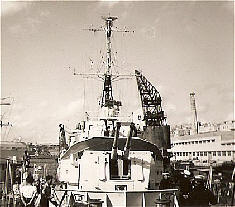CONDITIONS ON BOARD
As the months passed by we seldom had sufficient stowage space in our mess-decks for all of our gear. Most men purchased naval-type suitcases (sturdy green canvas with leather corners) to keep their extra personal possessions. The cases were stowed on top of the individual lockers. My locker, fortunately, was on top of someone else’s – they were stacked two-deep around the mess. I say ‘fortunately’ because there was an occasion when, as the ship was being refuelled in the dockyard, someone left a cover plate off the top of a fuel tank and our entire mess-deck was flooded with stinking black fuel oil, several inches deep. Most of our hammocks and bedding were ruined and much hard work was needed to clear up the foul mess. The smell was with us for quite some time afterwards – not conducive to the enjoyment of our meals. Of course we each were given a new hammock but the fitting of new brails and lashings took time and we were all weary before turning in that night.
Generally the food on board was good and adequate, but we were glad of the tuck parcels received from our families now and then. We also bought extra tuck from the ship’s tiny NAAFI ‘shop’, along with such items as tobacco, soap, toothpaste and other necessaries. In one of my letters to my parents I gave a sample menu so that my family could see that I was not being starved:-
Breakfast: Egg, bacon, rolls and tea (usual Sunday fare)
Dinner: Tomato soup, Pork, roast potatoes, cabbage, gravy.
Sweet: A kind of sponge topped with blancmange.
Tea: One jam puff (no jam in!), tea, bread and margarine.
Supper: Pork and egg pie with boiled potatoes, tea.
That was a Sunday menu which was usually a little better than other days. After a few days at sea, we usually found that dehydrated potatoes and cabbage were given us, together with tinned food. The bread would be staler unless, on occasions, the chef would do some fresh baking.
During exercises, emergencies and while ammunitioning ship, we worked hard and long, so that good food was vital to our morale. There were times, however, when morale reached a low ebb. Arduous work, long hours and limited chances for shore leave could build up a considerable pressure amongst the men. Then, to hear that a much awaited ‘make and mend’ was cancelled, was the last straw for some chaps. Tensions grew and there were a few flare-ups. In the early days we had difficulty getting our dhobeying (laundry) done.
Shortage of hot water, inadequate drying facilities and hardly any irons, made it difficult to keep our clothes and bedding clean. The second-hand sheets issued to me were quite grey, evidence that previous user(s) had experience similar problems. When the weather warmed up and we had to wear tropical kit it was a major task to cope with all the dhobeying. There was a small laundry on board, mainly for the officers, I guess, but the service was poor and the sailors seldom used it.
Pay day, for the National Servicemen, was always eagerly awaited. Our starting pay was one shilling per day, much less that our regular colleagues. It improved slightly with the passing of time and we were all glad when, after 18 months service, we received a moderate rise. But shore runs made us non-regulars very conscious of the cash shortage that we experienced. As an 18-year old I had not had a chance to build up any appreciable savings and the occasional postal order from home was greatly welcomed.
PERSONAL HYGIENE
Of course, personal hygiene is extremely important when hard-working men are living in cramped conditions in the lower decks of a ship. Though we often had to carry out our ablutions without hot water, most ratings took the trouble to keep themselves and their clothing clean. Those who neglected to do so could expect some rough treatment from their shipmates. I well remember how one such lazy matelot, daily becoming more unbearable, was finally given a lesson he may never forget. Dragged to the washroom, he was stripped of his clothing and roughly scrubbed all over with a deck scrubbing brush. His cries for mercy were unheeded but the ‘advice’ he was given by the men left him in no doubt as to the next level of treatment he would receive if he did not keep himself clean. Such incidents were few, probably because news of them spread fast and other potential offenders took the point.
THE HEADS
Toilets for ratings were known as “The Heads” in common naval parlance. I guess this was the traditional name for the latrines because they were usually located at the head of the ship, close to the bows.
On Manxman the ‘heads’ consisted of about a dozen cubicles with water-closets, each separated from the next by a steel partition about 4 feet in depth, sufficient to give one the minimum of privacy.
My reason for mentioning this subject is simply to relate an incident that left a vivid mark upon my memory. I visited the heads just at a time when gunnery practice was due to start – a major mistake, as I soon discovered. The forward 4-inch gun was located immediately above the heads and parts of its support pillar and ammunition hoist actually passed through the heads compartment. Seated in there I did not anticipate the consequence of a 4-inch shell being fired. The violence of the explosion can hardly be imagined unless personally experienced. Enclosed as I was in a virtual steel box, I felt the blast in every fibre of my body and my ear-drums felt shattered. I got out of there as fast as I could but my ears were ringing for quite some time!

Picture: Manxman's 'A' and 'B' guns, viewed from the bows.
Back to Home page